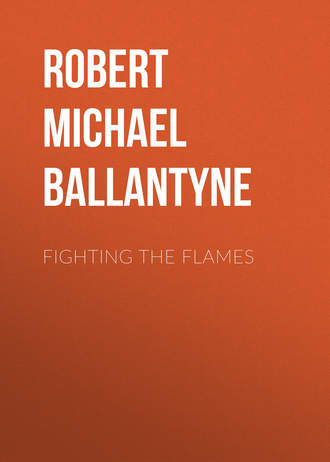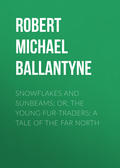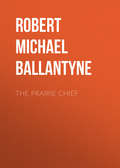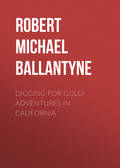
Robert Michael Ballantyne
Fighting the Flames
Chapter Three
Fire!!!
“Hallo, that’ll do, man!” cried the same stalwart fireman who had seized the small boy, stepping out and laying his hand on Hopkins’s shoulder, whereabouts is it?
Hopkins heard him not. One idea had burnt itself into the poor man’s brain, and that was the duty that lay on him to ring the alarm-bell! Seeing this, the fireman seized him, and dragged him forcibly—almost lifted him—into the station, round the door of which an eager crowd had already begun to collect.
“Calm yourself,” said the stalwart fireman quietly, as he thrust Hopkins down into a chair. “Consider now. You’ll make us too late if you don’t speak. Where is it?”
“B–B–Fire!” yelled Hopkins, gasping, and glaring round him on the men, who were quietly putting on their helmets.
Hopkins suddenly burst from the grasp of his captor, and, rushing out, seized the bell-handle, which he began to pull more furiously than ever.
“Get her out, Jim,” said the fireman in a low tone to one of his comrades (“her” being the engine); at the same time he went to the door, and again seizing Hopkins, brought him back and forced him into a chair, while he said firmly:
“Now, then, out with it, man; where’s the fire?”
“Yes, yes,” screamed Hopkins, “fire! fire that’s it! B–! B–Beverly!—blazes!—square!—number—Fire!”
“That’ll do,” said the fireman, at once releasing the temporary maniac, and going to a book where he calmly made an entry of the name of the square, the hour of the night, and the nature of the call. Two lines sufficed. Then he rose, put on his helmet, and thrust a small hatchet into his belt, just as the engine was dragged to the door of the station.
There was something absolutely magnificent in this scene which no pen can describe, because more than half its force was conveyed only by the eye and the ear. The strong contrast between human excitement and madness coupled with imbecility, and human calmness and self-possession coupled with vigorous promptitude, was perfect.
Just before poor Hopkins rang his first note of alarm the station had been wrapt in profound silence—the small boy’s interruption having been but a momentary affair. George Dale, the fireman in charge, was seated at a desk in the watch-room (known among firemen as the “lobby”), making an entry in a diary. All the other men—about thirteen in number—had gone to their respective homes and beds in the immediate neighbourhood, with the exception of the two whose turn it was to remain on duty all night. These two (named Baxmore and Corney), with their coats, belts, boots, and caps on, had just lain down on two low tressel couches, and were courting sleep. The helmets of their comrades hung on the walls round the room, with belts and hatchets underneath them. Several pairs of boots also graced the walls, and a small clock, whose gentle tick was the only sound that broke the silence of the night. In an outer room the dim form of a spare engine could be seen through the doorway.
The instant that the bell rang, however, this state of quietude was put to flight. The two men rose from their couches, and Dale stepped to the door. There was no starting up, no haste in their movements, yet there was prompt rapidity. The men, having been sailors, had been trained in the midst of alarms. The questions which were put to Hopkins, as above described, were rapidly uttered. Before they were answered the two men were ready, and at Dale’s order, “Get her out!” they both vanished.
One ran round the corner to the engine-house and “knocked up” the driver in passing. The other ran from door to door of the firemen’s abodes, which were close at hand, and with a loud double-ring summoned the sleepers. Before he got back to help the first with the engine, one and another and another door opened, and a man darted out, buttoning braces or coat as he ran. Each went into the station, seized his helmet, belt, and axe, from his own peg, and in another moment all were armed cap-à-pie. At the same instant that the engine appeared at the door a pair of horses were trotted up. Two men held them; two others fastened the traces; the driver sprang to his seat; the others leaped to their respective places. Each knew what to do, and did it at once. There was no hurry, no loss of time, no excitement; some of the men, even while acting with the utmost vigour and promptitude, were yawning away their drowsiness; and in less than ten minutes from the moment the bell first rang the whip cracked and the fire-engine dashed away from the station amid the cheers of the crowd.
It may be as well to remark here in passing, that the London Fire Brigade had, at the time of which we write, reached a high state of efficiency, although it could not stand comparison with the perfection of system and unity of plan which mark the organisation and conduct of the Brigade of the present day.
Mr Braidwood, the able Superintendent, had for many years been training his men on a system, the original of which he had begun and proved in Edinburgh. Modifying his system to suit the peculiarities of the larger field to which he had been translated, he had brought the “Fire Engine Establishment,” (which belonged at that time to several insurance companies) to a state of efficiency which rendered it a model and a training-school for the rest of the world; and although he had not the advantage of the telegraph or the powerful aid of the land steam fire-engine of the present day, he had men of the same metal as those which compose the force now.
The “Metropolitan Fire Brigade,” as it then existed under the control of the Metropolitan Board of Works, had been carried by its chief, Captain Eyre Massey Shaw, to a condition of efficiency little if at all short of perfection, its only fault being (if we may humbly venture a remark) that it was too small both in numbers of engines and men.
Now, good reader, if you have never seen a London fire-engine go to a fire, you have no conception of what it is; and even if you have seen it, but have not gone with it, still you have no idea of what it is.
To those accustomed to it, no doubt, it may be tame enough—we cannot tell; but to those who mount an engine for the first time and drive through the crowded thoroughfares of London at a wild tearing gallop, it is probably the most exciting drive conceivable. It beats steeple-chasing. It feels like driving to destruction—so wild and so reckless is it. And yet it is not reckless in the strict sense of that word; for there is a stern need-be in the case. Every moment (not to mention minutes or hours) is of the utmost importance in the progress of a fire. Fire smoulders and creeps at first, it may be, but when it has got the mastery, and bursts into flames, it flashes to its work and completes it quickly. At such times, one moment of time lost may involve thousands of pounds—ay, and many human lives! This is well known to those whose profession it is to fight the flames. Hence the union of apparent mad desperation, with cool, quiet self-possession in their proceedings. When firemen can work in silence they do so. No unnecessary word is uttered, no voice is needlessly raised. Like the movements of some beautiful steam-engine, which, with oiled pistons, cranks, and levers, does its unobtrusive work in its own little chamber in comparative stillness, yet with a power that would tear and rend to pieces buildings and machinery, so the firemen sometimes bend to their work quietly, though with mind and muscles strung to the utmost point of tension. At other times, like the roaring locomotive crashing through a tunnel or past a station, their course is a tumultuous rush, amid a storm of shouting and gesticulation.
So was it on the present occasion. Had the fire been distant, they would have had to commence their gallop somewhat leisurely, for fear of breaking down the horses; but it was not far off—not much more than a couple of miles—so they dashed round the corner of their own street at a brisk trot, and swept into Oxford Street. Here they broke into a gallop, and here the noise of their progress began, for the great thoroughfare was crowded with vehicles and pedestrians, many of whom were retiring from the theatres and music-halls, and other places of entertainment.
To pass through such a crowd without coming into collision with anything required not only the most dexterous driving, but rendered it necessary that some of the men on the engine should stand up and shout, or rather roar incessantly, as they whirled along, clearing everything out of their way, and narrowly escaping innumerable crashes by a mere hairbreadth.
The men, as we said before, having been sailors, seemed to shout with the memory of the boatswain strong upon them, for their tones were pitched in the deepest and gruffest bass-key. Sometimes there was a lull for a moment, as a comparatively clear space of a hundred yards or so lay before them; then their voices rose like the roaring of the gale as a stupid or deaf cabman got in their way, or a plethoric ’bus threatened to interrupt their furious passage.
The cross streets were the points where the chief difficulties met them. There the cab and van drivers turned into or crossed the great thoroughfare, all ignorant of the thunderbolt that was rushing on like a fiery meteor, with its lamps casting a glare of light before, and the helmets of its stern charioteers flashing back the rays of street-lamps and windows; for, late though the hour was, all the gin-palaces, and tobacconists’ shops, and many of the restaurants were still open and brightly illuminated.
At the corner of Wells Street, the crowd of cabs and other vehicles was so great that the driver of the engine began to tighten his reins, and Jim Baxmore and Joe Corney raised their voices to a fierce shout. Cabs, ’busses, and pedestrians scattered right and left in a marvellous manner; the driver slackened his reins, cracked his whip, and the horses stretched out again.
In passing Berners Street, a hansom cab swept round the corner, its dashing driver smoking a cigar in sublime self-satisfaction, and looking carelessly right and left for a “fare.” This exquisite almost ran into the engine! There was a terrific howl from all the firemen; the cabby turned his smart horse with a bound to one side, and lost his cigar in the act—in reference to which misfortune he was heartily congratulated by a small member of the Shoe-black Brigade,—while the engine went steadily and sternly on its way.
“There, it shows a light,” observed one of the firemen to Dale, as he pointed to a luminous appearance in the sky away to the north-east.
Dale was already looking in that direction, and made no reply.
As they reached Tottenham Court Road the driver again checked the pace a little; yet even at the reduced speed they passed everything like a whirlwind. The traffic here was so great that it behoved them to be more cautious. Of course, the more need that there was for caution, the more necessity was there for shouting; and the duty of Baxmore and Corney—standing as they did in front of their comrades beside the driver—became severe, but they had good lungs both of them!
At the point where Tottenham Court Road cuts Oxford Street, the accumulation of vehicles of all sorts, from a hand-barrow to a furniture-van, is usually very great. To one unaccustomed to the powers of London drivers, it would have seemed nothing short of madness to drive full tilt into the mass that blocked the streets at this point. But the firemen did it. They reined up a little, it is true, just as a hunter does in gathering his horse together for a rush at a stone wall, but there was nothing like an approach to stopping.
“Hi! Hi!! Hi!!!” roared the firemen, Baxmore and Corney high above the rest. A ’bus lumbered to the left just in time; a hansom sprang to the right, not a moment too soon; a luggage-van bolted into Crown Street; the pedestrians scattered right and left, and the way was clear—no, not quite clear! The engine had to turn at a right angle here into Tottenham Court Road. Round it went on the two off-wheels, and came full swing on a market-gardener and a hot-coffee woman, who were wheeling their respective barrows leisurely side by side, and chatting as they went.
The roar that burst from the firemen was terrific. The driver attempted both to pull up and to turn aside. The market-gardener dropt his barrow and fled. The hot-coffee woman, being of a resolute nature, thrust her barrow by main force on the footpath, and so saved her goods and herself by a hairbreadth, while the barrow of her friend was knocked in pieces. But the effort of the engine-driver to avoid this had well-nigh resulted in serious consequences. In endeavouring to clear the market-gardener he drew so near to the footpath that in another moment a lamp-post would have been carried away, and the wheels of the engine, in all probability, knocked off, had not Joe Corney observed the danger.
With a truly Irish yell Joe seized the rein next him, and pulled the horses round almost at a right angle. The nave of the hind-wheel just shaved the post as it flew by. The whole thing passed so swiftly that before the market-gardener recovered from his consternation the engine was only discernible in the distance by the sparks that flew from its wheels as it held on in its furious way.
All along its course a momentary disturbance of London equanimity was created. Families not yet abed rushed to their front windows, and, looking out, exclaimed, “Ha! the firemen.” Tipplers in gin-palaces ran to the doors and said, “There they go,” “That’s your sort,” “Hurrah, my hearties!” or, “Go it, ye cripples!” according to the different stages of inebriation at which they had arrived; and belated men of business stopped to gaze, and then resumed their way with thoughts and speculations on fire and fire insurance, more or less deep and serious according to temperament. But the disturbance was only temporary. The families retired to their suppers or beds, the tipplers returned to their tipple, the belated speculators to their dreams, and in a few minutes (no doubt) forgot what they had seen, and forgot; perchance, that they had any personal interest in fire raising, or fire extinction, or fire prevention, or fire in any dangerous shape or form whatever, or indulged in the comforting belief, mayhap, that whatever disasters might attend the rest of the London community, they and their houses being endued with the properties of the salamander, nothing in the shape of fire might, could, would, or should kindle upon them. So true is it that, “all men think all men mortal but themselves!”
Do you doubt this, reader? If so, go poll your acquaintance, and tell us how many of them have got rope-ladders, or even ropes, to escape from their houses should they take fire; how many of them have got hand-pumps, or even buckets, placed so as to be handy in case of fire; and how many of them have got their houses and furniture insured against fire.
Meanwhile, the fire-engine held on its way, until it turned into Beverly Square, and pulled short up in front of the blazing mansion of James Auberly, Esquire.
Another engine was already at work there. It had come from a nearer station, of the existence of which Hopkins had been ignorant when he set out on his wild race for help. The men of this engine were already doing their work quietly, but with perceptible effect, pouring incessant streams of water in at the blazing windows, and watching for the slightest lull in the ferocity of the smoke and flame to attack the enemy at closer quarters.
Chapter Four
A Fierce Fight With The Flames
When the small boy—whose name, it may be as well to mention, was William (alias Willie) Willders—saw the fire-engine start, as has been already described, his whole soul yearned to follow it, for, in the course of his short life, he had never succeeded in being at the beginning of a fire, although he had often been at the middle and end of one—not a very difficult thing in London, by the way, seeing that there are, on the average, between four and five fires every twenty-four hours!
Willie Willders was of an enquiring disposition. He wanted to know how things were managed at a fire, from the beginning to the end, and he found that the course of true inquiry, like another course we wot of, never did run smooth.
Poor Willie’s heart was with that engine, but his legs were not. They did their best, but they failed, strong and active though they were, to keep up with the horses. So Willie heaved a bursting sigh and slackened his speed—as he had often done before in similar circumstances—resolving to keep it in sight as long as he could, and trust to his eyesight and to the flames “showing a light” for the rest.
Just as he came to this magnanimous resolve, a strapping young gentleman called a passing cab, leaped in, ordered the driver to follow the engine, and offered double fare if he should keep it in view up to the fire.
Willie, being sharp as a needle, at once stepped forward and made as though he would open the door for the gentleman. The youth was already in and the door shut, but he smiled as he shouted to the driver, “All right!” and tossed a copper to Willie, with the remark, “There, you scamp!” The copper fell in the mud, and there Willie left it, as he doubled nimbly behind the vehicle, and laid hold of it.
The cabman did his best to earn his double fare, and thus it came to pass that Willie was in time to see the firemen commencing work.
As the young man leaped from the cab he uttered a cry of surprise and alarm, and rushed towards the crowd of firemen nearest to the burning house without paying his fare. Willie was a little astonished at this, but losing sight of the youth in the crowd, and seeing nothing more of him at that time, he became engrossed in other matters.
There were so many men on the ground, however—for just then a third engine dashed up to the scene of conflagration—that it was difficult for the excited boy to appreciate fully what he saw. He got as close to the engine, however, as the policemen would allow him, and observed that a fire-plug had been already opened, and over it had been placed a canvas cistern of about a yard long by eighteen inches broad, stretched on an iron frame. The cistern was filled with water to overflowing, and the first engine had placed its suction-pipe in it, while from the front of the engine extended the leathern hose that conveyed the water to the burning house.
Willie was deeply interested in this, and was endeavouring to solve certain knotty points in his own mind, when they were suddenly solved for him by a communicative dustman who stood in the crowd close by, and thus expounded the matter to his inquisitive son.
“You see, Tommy, the use o’ the cistern is hobvious. See, here’s ’ow it lies. If an ingin comes up an screwges its suction on to the plug, all the other ingins as comes after it has to stan’ by an’ do nuffin. But by puttin’ the cistern over the plug an’ lettin’ it fill, another ingin or mabbe two more, can ram in its suction and drink away till it’s fit to burst, d’ye see.”
Willie drank in the information with avidity, and then turned his attention to the front of the engine, to which several lengths of hose, each forty feet long, had been attached. Baxmore and Corney were at the extreme end, screwing on the “branch” or nozzle by which the stream of water is directed, and Dale was tumbling a half-drunk and riotous navvy head-over-heels into the crowd, in order to convince him that his services to pump were not wanted—a sufficient number having been procured. A couple of policemen walked this navvy quietly from the scene, as Dale called out:
“Down with her, boys!”
“Pump away, lads!” said one of the firemen, interpreting.
The volunteers bent their backs, and the white clouds of steam that issued from the burning house showed that the second engine was doing its work well.
Immediately after, Dale and his men, with the exception of those required to attend the engine and the “branch,” were ordered to get out the ladders.
He who gave this order was a tall, sinewy man, middle-aged apparently, and of grave demeanour. His dress was similar to that of the other firemen, but there was an air of quiet unobtrusive authority about him, which showed that he was a leader.
“We might get on the roof now, Mr Braidwood,” suggested Dale, touching his helmet as he addressed the well-known chief of the London Fire-Engine Establishment.
“Not yet, Dale, not yet,” said Braidwood; “get inside and see if you can touch the fire through the drawing-room floor. It’s just fallen in.”
Dale and his men at once entered the front door of the building, dragging the branch and hose along with them, and were lost in smoke.
Previous to the arrival of the fire-engines, however, a scene had been enacted which Willie Willders had not witnessed. A fire-escape was first to reach the burning house. This was then, and still is, usually the case, owing to the fact that escapes are far more numerous in London than engines, so that the former, being always close at hand, often accomplish their great work of saving life before the engines make their appearance.
The escape in the immediate neighbourhood of Beverly Square was under the charge of Conductor Samuel Forest, a man who, although young, had already saved many lives, in the service of the Society for the Protection of Life from Fire.
When Forest reached the field of action, Mr James Auberly was seen at an upper window in a state of undignified dishabille, shouting for help, and half suffocated with smoke, with Mrs Rose hanging round his neck on one side and Matty Merryon at the other. Poor Auberly, having tried the staircase on the first alarm, was driven back by smoke, and rushed wildly to the window, where the two domestics, descending in terror from their attic, clung to him and rendered him powerless.
Forest at once pitched his escape—which was just a huge scientifically-constructed ladder, set on wheels. The head of it reached to the windows of the second floor. By pulling a rope attached to a lever, he raised a second ladder of smaller size, which was fitted to the head of the large one. The top of this second ladder was nearly sixty feet from the ground, and it reached the window at which Mr Auberly was still shouting. Forest at once sprang up.
“Leave me; save the women,” gasped Auberly, as a man entered the room, but the dense smoke overpowered him as he spoke, and he fell forward. The women also sank to the ground.
Forest instantly seized Mrs Rose in his powerful arms, and hurrying down the ladder to the top of the escape, put her into the canvas trough or sack which was suspended below the ladder all the way. Down this she slid somewhat violently but safely to the ground, while Forest ran up again and rescued Matty in the same way. Mr Auberly was more difficult to manage, being a heavy man, and his rescuer was almost overpowered by the thick smoke in the midst of which all this was done. He succeeded, however, but fainted on reaching the ground.
It was at this point that the first engine arrived, and only a few minutes elapsed when the second made its appearance, followed by the cab from which the young man leapt with the exclamation of surprise and alarm that had astonished Willie Willders.
Pushing his way to the place where Mr Auberly and the others lay, the youth fell on his knees. “My father!” he exclaimed wildly.
“He’s all right, lad,” said Mr Braidwood, coming up at that moment, and laying his hand kindly on the youth’s shoulder; “he’s only choked with smoke, and will be better in a minute. Any more in the house?” he added quickly.
Young Auberly leaped up with a shout.
“My sister! is she not saved? Are all here?”
He waited not for a reply, but in another moment was on the fire-escape.
“After him, two of you,” said Braidwood, turning to his men.
Two at once obeyed. In fact, they had leaped forward almost before the brief command was uttered. One of these firemen was conspicuous for his height and strength. He was first up the ladder. Close upon him followed Baxmore with a lantern.
Nothing but smoke had yet reached the room into which young Auberly entered, so that he instantly found himself in impenetrable darkness, and was almost choked as well as blinded.
“Have a care, Frank; the floor must be about gone by this time,” said Baxmore, as he ran after his tall comrade.
The man whom he called Frank knew this. He also knew that it was not likely any one had been left in the room from which the master of the house had been rescued, and he thought it probable that his daughter would occupy a room on the same floor with her father. Acting on this supposition, and taking for granted that the room they were about to enter was Mr Auberly’s bedroom, the tall fireman dashed at once through the smoke, and tumbled over the prostrate form of young Auberly.
“Look after him, Baxmore,” he gasped, as he seized the lamp from his comrade’s hand, and darted across the room and out into the passage, where he went crash against a door and burst it open. Here the smoke was not so dense, so that he could breathe, though with difficulty.
One glance showed him where the bed was. He felt it. A female form was lying on it. The light weight and the long hair which swept across his face as he raised it gently but swiftly on his shoulder, told him that it was that of a girl.
At that moment he heard a loud shout from the crowd, which was followed by a crash. Dashing once more across the passage, he saw that a lurid flame was piercing the smoke in the other room. The staircase he knew was impassable; probably gone by that time; but he had not time to think, so he drew the blanket over the girl’s head and bounded towards the window. There was a feeling of softness under his feet, as if the floor were made of pasteboard. He felt it sinking beneath him. Down it went, just as he laid hold of the head of the fire-escape, from which he hung suspended in the midst of the smoke and sparks that rose from the falling ruin.
Strong though the young fireman was, he could not raise himself by one arm, while the other was twined round Louisa Auberly. At that moment, Baxmore, having carried young Auberly down in safety, again ascended and appeared at the window. He seized Frank by the hair of the head.
“Let go my hair, and catch the girl!” shouted Frank.
“All right,” said Baxmore, seizing Loo and lifting her over the window sill.
Frank being thus relieved, swung himself easily on the sill, and grasping Loo once more, descended to the street, where he was met by Mr Auberly, who had recovered from his state of partial suffocation, and who seized his child and hurried with her into a neighbouring house. Thither he was followed by Mrs Rose and Matty, who had also recovered.
During these episodes, the firemen had continued at their work with cool and undistracted attention. And here the value of organisation was strikingly and beautifully brought out; for, while the crowd swayed to and fro, now breathless with anxiety lest the efforts of the bold conductor of the fire-escape should fail; anon wild with excitement and loud in cheers when he succeeded, each fireman paid devoted and exclusive attention to his own prescribed piece of duty, as if nothing else were going on around him, and did it with all his might—well knowing that every other piece of work was done, or point of danger guarded, by a comrade, while the eagle eyes of Mr Braidwood and his not less watchful foremen superintended all, observed and guided, as it were, the field of battle.
And truly, good generalship was required, for the foe was fierce and furious. The “devouring element” rushed onward like a torrent. The house was large and filled with rich furniture, which was luxurious food for the flames as they swept over the walls, twined round the balustrades, swallowed the paintings, devoured the woodwork, and melted the metal in their dread progress. But the foe that met them was, on this occasion, more than a match for the flames. It was a hand-to-hand encounter. The men followed them foot by foot, inch by inch—sometimes almost singeing their beards or being well-nigh choked and blinded by dense volumes of smoke, but, if driven back, always returning to the charge. The heat at times beat on their helmets so fiercely that they were forced to turn their faces aside and half-turn their backs on the foe, but they always kept their weapons—the “branches”—to the front, and continued to discharge upon him tons and tons of aqueous artillery.
“Get up to the windows now; use the escape,” said Mr Braidwood; and as he said this he passed through the doorway of the burning house.
Some of the men rushed up the escape and let down a line, to which one of the branches was made fast.
“Avast pumpin’, number two!” shouted Baxmore from the midst of clouds of smoke that were bursting out from the window.
Number two engine was stopped. Its branch was pulled up and pointed inside straight at the fire; the signal given, “Down with number two!” and a hiss was followed by volumes of steam.
The work of extinction had at last begun in real earnest. As long as they could only stand in the street and throw water in through the windows at haphazard, they might or might not hit the fire—and at all events they could not attack its strong points; but now, Baxmore at one window, and one of the men of the first engine at another, played point-blank into the flames, and, wherever the water hit, they were extinguished. Presently they got inside and began to be able to see through the smoke; a blue glimmer became visible, the branch was pointed, and it was gone. By this time the second floor had partly given way, and fire was creeping down the rafters to the eaves of the house. Baxmore observed this; and pointed the branch straight up. The fire at that part was put out, and a heavy shower of water fell back on the fireman, drenching him to the skin.







